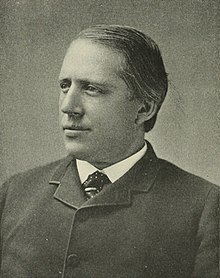Arthur Pue Gorman
| Arthur Pue Gorman | |
|---|---|
 |
|
|
United States Senator from Maryland |
|
|
In office March 4, 1881 – March 4, 1899 |
|
| Preceded by | William P. Whyte |
| Succeeded by | Louis E. McComas |
|
In office March 4, 1903 – June 4, 1906 |
|
| Preceded by | George Wellington |
| Succeeded by | William P. Whyte |
| Member of the Maryland Senate | |
|
In office 1875–1881 |
|
| Member of the Maryland House of Delegates | |
|
In office 1869–1875 |
|
| Personal details | |
| Born |
March 11, 1839 , Maryland |
| Died | June 4, 1906 (aged 67) Washington, D.C. |
| Resting place | Oak Hill Cemetery |
| Political party | Democratic |
| Spouse(s) | Hattie Donagan (m. 1867) |
| Relations | Peter Gorman (father), William Henry Gorman (brother) |
| Children | Haddie, Ada, Grace, Arthur P. Jr., Anne Elizabeth (Bessie), and Mary |
Arthur Pue Gorman (March 11, 1839 – June 4, 1906) was a United States Senator from Maryland, serving from 1881 to 1899 and from 1903 to 1906. He also served in the Maryland House of Delegates from 1869 to 1875, and the Maryland State Senate to 1881. He was a prominent leader of the Democratic Party and later served as a member of the "Mills Commission" which investigated the origins of baseball.
Gorman was born in on March 11, 1839, to parents Peter and Elizabeth A. Gorman (née Brown). The oldest of five children, he was named after the family's physician, Dr. Arthur Pue. Gorman's paternal grandfather, John, emigrated to the U.S. from Ireland circa 1794, first settling in Harrisburg, Pennsylvania before moving to the Baltimore area. Arthur's immediate family, including younger brother William Henry Gorman, moved to Laurel, Maryland in 1848, where they had a 150-acre (61 ha) farm. Arthur had attended public schools though there were none in Laurel; Gorman's father hired a succession of tutors until arranging with Congressman William T. Hamilton and Edward Hammond a position for his son as a U.S. Senate page at age 11 in 1850.
Gorman became friends with Illinois senator Stephen A. Douglas (famous regular Democratic presidential candidate in the split Election of 1860 versus Republican candidate Abraham Lincoln whom he earlier debated in a series of debates for the Illinois seat in the U.S. Senate), who made him his private secretary. Gorman subsequently served the U.S. Senate in various offices as page, messenger, Assistant Doorkeeper, Assistant Postmaster, and finally Postmaster.
...
Wikipedia
